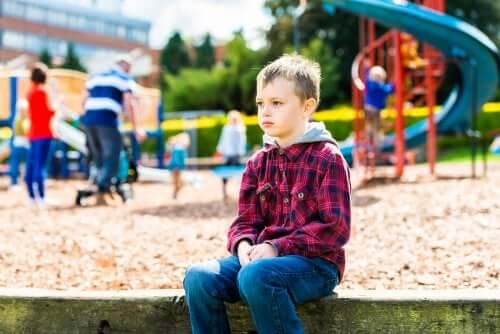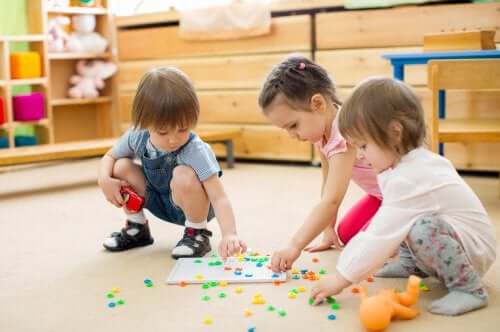When Children Don't Play with Their Classmates

It’s very common for parents to worry if their children don’t play with their classmates when they start school. Children begin to relate to other young children from birth.
A few weeks after they’re born, they begin to smile, look for glances, and interact with the people around them, usually with their parents and siblings. From age three, they begin to play games with other children.
A three-year-old can have some difficulties relating to others because they need to adapt, and they’ll achieve this with the help of their guardian or parents – without forcing them.
You don’t have to dramatize nor believe things are worse than they are. Sometimes, you’ll see your child playing alongside other children, but without building those special friendship bonds that people build as adults. For children, a friend is any person they play or spend time with.
If you want to make sure your child doesn’t stay on the sidelines, you have to help him understand how important it is to have friends, how to do it, and how to keep them. Never force children to be friends with someone nor forbid them from talking to someone; they should choose their own friends.
To ensure your child can make friends, it’s important for your child to have the opportunity to interact with other children his own age and not just at school. You have to go out with your child, go to the park, allow him to do extracurricular activities with other children…
Why don’t my children play with their classmates?
As a parent, you have to teach your children how essential the values of friendship, humility, kindness, and empathy are. This is important, as it’ll allow them to know how to build and maintain friendships. Thus, you’ll have to teach them how to win and how to lose, how to collaborate and cooperate, and to not be overly competitive.

If your three- to four-year-old child doesn’t play with his or her classmates, try to arrange a meeting with other parents to go to the park together so your child is more confident when school starts.
Don’t forget to go to the birthday parties they organize. But don’t rush things; give your children the time they need to adapt and open themselves up to the world. If your children are older, go talk to their teachers and discover what might be going on.
Shyness could be one of the reasons why some children don’t play with their classmates. Don’t forget that being shy is a personality trait, a way of being that a child externalizes through embarrassment and that can be limiting socially speaking.
If your child is feeling embarrassed, it’s probably because he’s afraid of making a fool of himself or being mocked. We’ve all experienced this feeling in our lives.
How to encourage children to play with their classmates?
At age two to three, the first signs of shyness and embarrassment start manifesting. However, as children grow, they start disappearing. Still, you must make your children feel safe and listen to them.
Don’t label them nor overprotect them. Rather, help boost their social interactions and boost their self-esteem by showing them that they can achieve anything they set their mind to.
It’s very important to be aware of whether they changed their behavior lately, if they don’t want to go to school or don’t want to be with their friends for some reason, or if they’re sad or irritable. You have to be aware of sudden behavior changes for no apparent reason.
In the case of domestic harassment, you should see if they avoid being with someone in particular, change their behavior, lose their appetite, or are sad or irritable. In addition, you must also observe how they play.
Look at the drawings they make or if they have recurring nightmares. These are all tell-tale signs that something is wrong.

Other reasons why some children don’t play with their classmates is due to social phobia, separation anxiety, autism spectrum disorder, high capacities, or problems at home.
When it comes to children between the ages of three and four, they’re probably undergoing a phase of adaptation to change. Otherwise, it’s advisable to pay attention and seek help from a specialist.
It’s very common for parents to worry if their children don’t play with their classmates when they start school. Children begin to relate to other young children from birth.
A few weeks after they’re born, they begin to smile, look for glances, and interact with the people around them, usually with their parents and siblings. From age three, they begin to play games with other children.
A three-year-old can have some difficulties relating to others because they need to adapt, and they’ll achieve this with the help of their guardian or parents – without forcing them.
You don’t have to dramatize nor believe things are worse than they are. Sometimes, you’ll see your child playing alongside other children, but without building those special friendship bonds that people build as adults. For children, a friend is any person they play or spend time with.
If you want to make sure your child doesn’t stay on the sidelines, you have to help him understand how important it is to have friends, how to do it, and how to keep them. Never force children to be friends with someone nor forbid them from talking to someone; they should choose their own friends.
To ensure your child can make friends, it’s important for your child to have the opportunity to interact with other children his own age and not just at school. You have to go out with your child, go to the park, allow him to do extracurricular activities with other children…
Why don’t my children play with their classmates?
As a parent, you have to teach your children how essential the values of friendship, humility, kindness, and empathy are. This is important, as it’ll allow them to know how to build and maintain friendships. Thus, you’ll have to teach them how to win and how to lose, how to collaborate and cooperate, and to not be overly competitive.

If your three- to four-year-old child doesn’t play with his or her classmates, try to arrange a meeting with other parents to go to the park together so your child is more confident when school starts.
Don’t forget to go to the birthday parties they organize. But don’t rush things; give your children the time they need to adapt and open themselves up to the world. If your children are older, go talk to their teachers and discover what might be going on.
Shyness could be one of the reasons why some children don’t play with their classmates. Don’t forget that being shy is a personality trait, a way of being that a child externalizes through embarrassment and that can be limiting socially speaking.
If your child is feeling embarrassed, it’s probably because he’s afraid of making a fool of himself or being mocked. We’ve all experienced this feeling in our lives.
How to encourage children to play with their classmates?
At age two to three, the first signs of shyness and embarrassment start manifesting. However, as children grow, they start disappearing. Still, you must make your children feel safe and listen to them.
Don’t label them nor overprotect them. Rather, help boost their social interactions and boost their self-esteem by showing them that they can achieve anything they set their mind to.
It’s very important to be aware of whether they changed their behavior lately, if they don’t want to go to school or don’t want to be with their friends for some reason, or if they’re sad or irritable. You have to be aware of sudden behavior changes for no apparent reason.
In the case of domestic harassment, you should see if they avoid being with someone in particular, change their behavior, lose their appetite, or are sad or irritable. In addition, you must also observe how they play.
Look at the drawings they make or if they have recurring nightmares. These are all tell-tale signs that something is wrong.

Other reasons why some children don’t play with their classmates is due to social phobia, separation anxiety, autism spectrum disorder, high capacities, or problems at home.
When it comes to children between the ages of three and four, they’re probably undergoing a phase of adaptation to change. Otherwise, it’s advisable to pay attention and seek help from a specialist.
All cited sources were thoroughly reviewed by our team to ensure their quality, reliability, currency, and validity. The bibliography of this article was considered reliable and of academic or scientific accuracy.
- Albornoz Zamora, E. J. (2017). La adaptación escolar en los niños y niñas con problemas de sobreprotección. Universidad y Sociedad, 9(4), 177-180. http://rus.ucf.edu.cu/index.php/rus
- García-Bacete, Francisco-Juan; Lara Carrión, Ana; Monjas Casares, Mª Inés. (2005) ¿Por qué los niños no quieren jugar con otros niños? Un análisis exploratorio de los motivos de rechazo entre iguales. International Journal of Developmental and Educational Psychology, vol. 1, núm. 1, 2005, pp. 257-268 https://www.redalyc.org/pdf/3498/349832486018.pdf
This text is provided for informational purposes only and does not replace consultation with a professional. If in doubt, consult your specialist.








